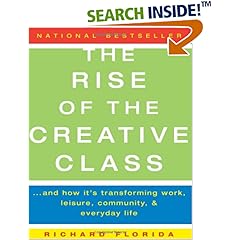HT: Shaw
HT: Shaw
 Perhaps the most siginficant ruling since Roe vs. Wade, today’s Supreme Court constitutional ban on late term abortion procedures has pro-choicers up in arms. Will this launch a pro-life trend? Much hangs in the balance this presidential election, and it seems that our options are slim. See the article here.
Perhaps the most siginficant ruling since Roe vs. Wade, today’s Supreme Court constitutional ban on late term abortion procedures has pro-choicers up in arms. Will this launch a pro-life trend? Much hangs in the balance this presidential election, and it seems that our options are slim. See the article here.
Check out Richard Florida’s (of Creative Class fame) recent blog entry:
So I was ecstatic to meet Rod Garvin who was one of the 30 community catalysts in our Knight Initiative in Charlotte, and even more ecstatic to find this thoughtful post on Rod’s blog.
“As a Christian and a creative person by nature, Florida’s theories resonate with me on many levels….Florida emphatically stresses that everyone is creative, but we need an economy which allows all people to utilize that God given talent, especially those in the service and manufacturing sectors, so that they can contribute more ideas, and hopefully improve their compensation as well. The kind of conversations I am having as a part of this initiative should be happening in the church, and a few congregations are having this dialog. But, are Christians as a whole ready to tackle some tough and uncomfortable questions? What happens when society becomes more accepting of gays and lesbians than the church? Racism and ethnic separation is a global problem, but churches are far more segregated than most corporations and many neighborhoods. Poverty and low wages are driven by economic structures and policies, though personal choices can play a role. Do we have the courage to ask if our capitalist economy can be made better and turn scarcity into abundance? How do these issues affect our ability to bear witness to the Good News of God’s Kingdom? How can Christians become the creative Revolutionaries we are called to be?”
Rod and I talked for quite some time about this. It’s clear that creative types are moving away from organized religion to less hierarchical and more organic forms of spirituality and spiritual expression. And for reasons similar to other large-scale organizations, organized religions are having great trouble responding in a forward looking way.
Westminster Bookshop is running a pretty drastic sale-of-the-week to make up for a lag in business. This week focuses on Reformed books. Check it out here WTSBOOKS Sale of the Week